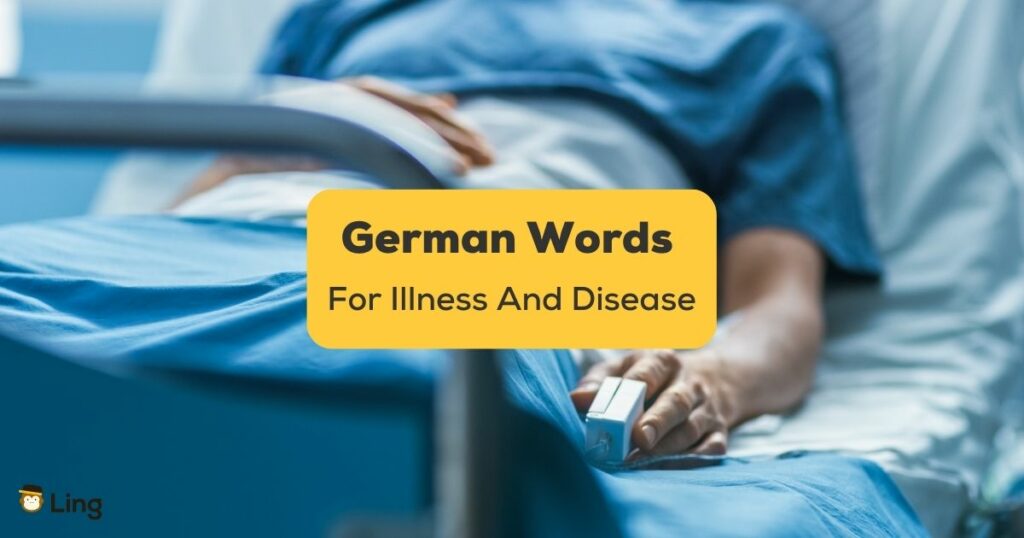Wondering about the German illness and disease words? We got you covered! In this post, we’ll go over the best terminologies you need the next time you find yourself in a German-speaking country!
Bidding “Guten Morgen” (Good morning) to the vibrant city of Berlin, exploring the charming lanes of Heidelberg, or savoring the renowned beers in Munich – your German adventure awaits. But then, reality checks in. You wake up one morning in your quaint German guesthouse with a throbbing headache, a persistent cough, or maybe a troublesome stomach. You’ve clearly caught an illness, but there’s a tiny hiccup. You’re in a foreign land with a language quite different from yours, and now, you need to navigate the healthcare system.
Does this scenario sound intimidating? Well, it doesn’t have to be.
Learning a language goes beyond just memorizing tourist phrases or ordering your favorite food. It also involves understanding key terms related to your health and well-being. This knowledge comes in handy during unexpected situations like falling ill while traveling or even if you’re planning to live in Germany long-term. Being able to communicate your health condition accurately can make a significant difference in the quality and timeliness of the care you receive.
Ready to learn? Let’s begin!

Basic German Illness And Disease Words
When we first learn a new language, we usually focus on greetings, common phrases, and perhaps even a few compliments to charm the locals. However, when it comes to practicality, understanding basic health and illness vocabulary can be incredibly useful, especially when you’re navigating a new country like Germany.
From the common cold to more chronic conditions, being able to articulate your health status not only helps you seek the right help but also makes you feel more confident in a foreign setting. So, let’s arm you with some essential German words related to common health issues.
Common Cold & Flu: Erkältung & Grippe
Cold and flu are, unfortunately, a part of life, and they’re as common in Germany as they are elsewhere. They usually come with a series of symptoms that most of us are all too familiar with. Here’s how you can express these symptoms in German:
| English | German |
|---|---|
| Cold | die Erkältung |
| Flu | die Grippe |
| Cough | der Husten |
| Fever | das Fieber |
| Sore throat | die Halsschmerzen |
| Runny nose | die laufende Nase |
| Sneezing | das Niesen |
Digestive Issues: Verdauungsprobleme
Whether it’s from trying new foods, a bug you caught, or a chronic condition, digestive issues can be quite troublesome. Here’s how to express common digestive ailments in German:
| English | German |
|---|---|
| Stomachache | die Bauchschmerzen |
| Nausea | die Übelkeit |
| Diarrhea | der Durchfall |
| Constipation | die Verstopfung |
| Heartburn | das Sodbrennen |
| Indigestion | die Verdauungsstörungen |
Pain Related: Schmerzbezogene Begriffe
Pain is your body’s way of telling you that something isn’t quite right. It can be acute or chronic, mild or intense, and can occur in any part of your body. Here are some words to express common types of pain in German:
| English | German |
|---|---|
| Pain | die Schmerzen |
| Headache | die Kopfschmerzen |
| Back pain | die Rückenschmerzen |
| Toothache | die Zahnschmerzen |
| Earache | die Ohrenschmerzen |
| Muscle pain | die Muskelschmerzen |
Remember, experiencing a health issue while you’re in Germany, or any foreign country, doesn’t have to be a scary experience. Being armed with the right vocabulary can help you effectively communicate your situation and get the help you need.

Specific Diseases In German
While basic health terms will help you navigate most everyday situations, knowing the names of specific diseases can be beneficial in more serious circumstances. Whether it’s for personal reasons, professional settings, or understanding the local news, these words can come in handy. Let’s delve into how to articulate some specific diseases and disorders in German.
Cardiovascular Diseases: Herz-Kreislauf-Erkrankungen
Cardiovascular diseases are a leading cause of death globally, making it crucial to understand their terminology, especially if you or a loved one has a history of heart-related conditions. Here are some cardiovascular diseases translated into German:
| English | German |
|---|---|
| Heart disease | die Herzkrankheit |
| High blood pressure | der hohe Blutdruck |
| Stroke | der Schlaganfall |
| Heart attack | der Herzinfarkt |
| Atherosclerosis | die Arteriosklerose |
Respiratory Diseases: Atemwegserkrankungen
Whether it’s a common respiratory condition or something more severe, being able to express these diseases accurately can be crucial. Here’s how you can say them in German:
| English | German |
|---|---|
| Asthma | das Asthma |
| Pneumonia | die Lungenentzündung |
| Tuberculosis | die Tuberkulose |
| Chronic obstructive pulmonary disease (COPD) | die chronisch obstruktive Lungenerkrankung (COPD) |
Neurological Disorders: Neurologische Störungen
Neurological disorders affect the nervous system and can impact a person’s quality of life significantly. Here’s how to express some common ones in German:
| English | German |
|---|---|
| Alzheimer’s | der Alzheimer |
| Epilepsy | die Epilepsie |
| Parkinson’s | das Parkinson |
| Migraine | die Migräne |
Remember, being able to communicate accurately about your health in German, especially about specific diseases, can not only help you understand your medical situation better but also aid in receiving appropriate and timely healthcare.

Hospital And Pharmacy Terms
Healthcare systems can differ greatly from one country to another. In Germany, you’ll find that hospitals and pharmacies are very efficient and well-equipped. However, they can also be a little daunting if you’re not familiar with the local language. Knowing the right terms will not only help you navigate these spaces with more confidence, but it can also make a significant difference in your healthcare experience.
At the Hospital: Im Krankenhaus
If you need to visit a hospital while you’re in Germany, understanding the basic terminology can be incredibly beneficial. It can help you communicate effectively with healthcare professionals, make sense of signage, and better comprehend any information given to you. Here are some important words you might encounter:
| English | German |
|---|---|
| Hospital | das Krankenhaus |
| Emergency room | die Notaufnahme |
| Doctor | der Arzt / die Ärztin |
| Nurse | der Krankenpfleger / die Krankenschwester |
| Patient | der Patient / die Patientin |
| Prescription | da Rezept |
| Health insurance | die Krankenversicherung |
At the Pharmacy: In der Apotheke
In Germany, pharmacies are called “Apotheke” and are marked by a big, red ‘A.’ From getting over-the-counter drugs to getting prescription medicines, you’ll likely find yourself visiting one during your stay. Here’s a list of useful terms to know:
| English | German |
|---|---|
| Pharmacy | die Apotheke |
| Medicine | das Medikament |
| Over the counter | rezeptfrei |
| Prescription drugs | die verschreibungspflichtigen Medikamente |
| Side effects | die Nebenwirkungen |
| Dosage | die Dosierung |
Navigating hospitals and pharmacies in a foreign country can seem intimidating, but knowing these German terms can help make your experience smoother and less stressful. Always remember being able to communicate effectively is key to receiving the healthcare you need.
Learn German With Ling
Learning the German words for illnesses and diseases can seem a bit daunting, but remember, every new term you learn is a step closer to mastering the language. And with the Ling app, you can make this process even more fun and engaging. Ling offers a range of languages, including German, and it’s designed to make language learning enjoyable and accessible. So, why not give it a try?
Download it today from the App Store or Play Store to get started!


































































